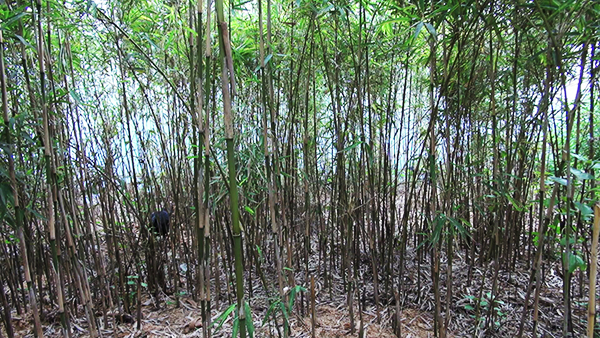 Dew-Yangka, a bamboo reed species found in abundance in Gyala village under Wangdue Phodrang is sought after for making traditional Bhutanese arrows (Damo Yangka-Dew). Dew-Yangka is surrounded by myths and beliefs which is why it has now turned into a stable source of income for the farmers. And today more farmers are into its cultivation.
Dew-Yangka, a bamboo reed species found in abundance in Gyala village under Wangdue Phodrang is sought after for making traditional Bhutanese arrows (Damo Yangka-Dew). Dew-Yangka is surrounded by myths and beliefs which is why it has now turned into a stable source of income for the farmers. And today more farmers are into its cultivation.
Bamboo reeds surrounding houses is a familiar sight in Jala. People grow Dew Yangka on three to four decimals of land that are properly fenced. The villagers attribute the unique and superior quality of Dew Yangka to a local belief. It is believed the bamboo species is a creation of a mermaid living in the lake above the village. Growing the plant next to a house is said to ward off evil spells and spirits.
The species, considered rare, was initially found in the high mountains of Gyala. But as its preference grew among the archers, the villagers started to grow Dew Yangka in their farms.
“At times, I sell around 80 pairs of bamboo in a year. Normally, I sell for Nu 350 to 500 per pair. The income helps meet my family’s daily expenses,” said Zeko, a Farmer in Gyala chiwog under Ruebisa Gewog in Wangdue Phodrang.
“It hasn’t been long since I started selling dew yangka and I am already reaping its benefits. We have buyers coming to our village and during other times when we need money, we take our product to the market. It is our extra source of income. Moreover, growing the bamboo species requires less hard work. We don’t have to water the plants or do the weeding,” added Phurba, also from Gyala.
“I don’t grow the bamboo species as much as others. Still, I fetch around Nu 10,000 annually. I take my product to Gelegphu and other nearby places,” said Nim Dorji.
The easy and promising income is encouraging many farmers to grow the bamboo species on a larger scale. The majority of the 35 households in the village are into its farming.
“I am planning to increase the production. I already identified around 15 decimals and am preparing the land for plantation. Actually, I planned to complete the work earlier but the weather didn’t favour me. I am waiting for the rainy season to begin,” added Phurba.
For now, looking at the enthusiasm of the villagers, the bamboo species will continue to flourish. Encouraged by economic opportunities and bolstered by local beliefs, they indirectly contribute to preserving the popular yet rare Dew Yangka.
For Changa Dorji, Wangdue Phodrang








